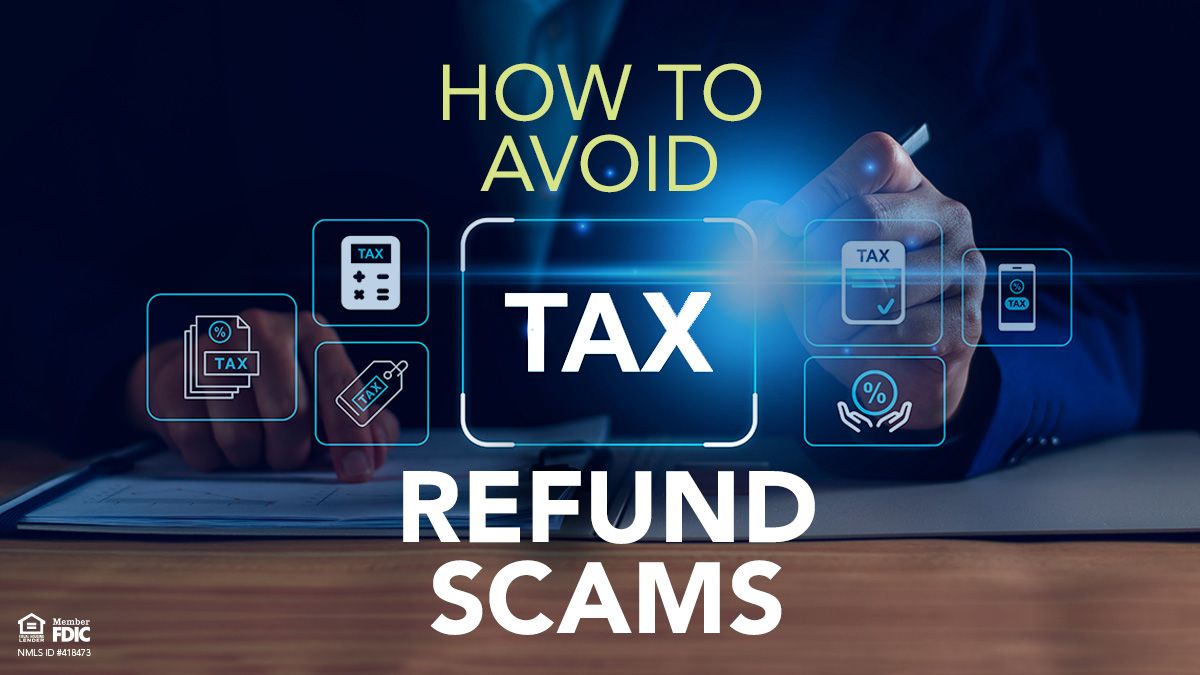
Tax Refund Scams
Krystal Bryce | BSA/AML Analyst | Customer Education
As with many unpleasant things, we often put off our taxes until the last minute. But as much as you don't want to face those 1040 forms, there's one very good reason to file well before April 15...it's your best defense against tax-related identity theft.
Tax refund scams are a type of financial fraud where criminals impersonate Internal Revenue Service (IRS) agents or other government representatives and attempt to trick you into sending them personal information. These schemes can involve text message scams, email schemes, and phone scams. The IRS also warns people to watch out for signs of potential unemployment fraud. States have experienced a surge in fraudulent unemployment claims filed by organized crime rings using stolen identities. Criminals are using stolen identities to fraudulently collect benefits. Perpetrators are also filing fake returns, having the refund deposited to your bank account, and then contacting you posing as IRS agents or IRS debt collectors to reclaim the erroneous payment. It pays to be proactive in safeguarding personal data.
Taxpayers should be on the lookout for new variations of tax-related scams. In the latest twist on a scam related to Social Security numbers, scammers claim to be able to suspend or cancel the victim's SSN. It's yet another attempt by con artists to frighten people into returning 'robocall' voicemails.
Scammers may mention overdue taxes in addition to threatening to cancel the person's SSN. If taxpayers receive a call threatening to suspend their SSN for an unpaid tax bill, they should just hang up. Make no mistake….it's a scam.
Beware of these warning signs:
- A notice from the IRS that more than one return was filed using your Social Security Number.
- A warning from the IRS that you didn't declare all your income, based on wages from an employer or job you do not recognize.
- You get an IRS notice that an online account has been created in your name, and you didn't create it.
- You've been assigned an Employee Identification Number (EIN) that you didn't ask for.

How to protect yourself from these scams:
- File your return as early as possible and check the www.irs.gov/refunds page for the status of you refund.
- Know your tax preparer. Ask about data security and what they do to protect your information.
- Keep personal and financial documents secure and shred them when no longer needed.
- Take steps to protect your identity online.
- Do not give out personal information such as your address, date of birth, and Social Security number unless you know who is asking for it and why.
- Never click links or open attachments in an email unless you are certain of who sent it and why.
Steps for victims of identity theft:
- If you are a victim of Tax ID fraud, call the IRS Identity Specialized Unit at 800.908.4490 and notify your state tax agency.
- File a complaint with the FTC at www.identitytheft.gov
- Contact one of the three major credit bureaus to place a 'fraud alert' on your credit records: www.equifax.com, www.experian.com, www.transunion.com.
- Close any financial or credit accounts opened by identity thieves.
We know identity theft can be frustrating and confusing for victims. When it comes to tax-related identity theft, the IRS wants to resolve your case as quickly as possible. The IRS has worked hard to help victims if identity theft by making improvements and shortening the time it takes to resolve these complex situations.
About GBC
Georgia Banking Company (GBC) is a full-service, commercial community bank headquartered in Atlanta, Georgia. GBC's team of veteran bankers know their communities and are focused on leveraging technology to deliver an exceptional service experience to meet the needs of growing businesses and private banking clients. The bank also offers a unique suite of mortgage products to independent mortgage bankers across the nation. Visit GeorgiaBanking.com to learn more.
2.22.24


